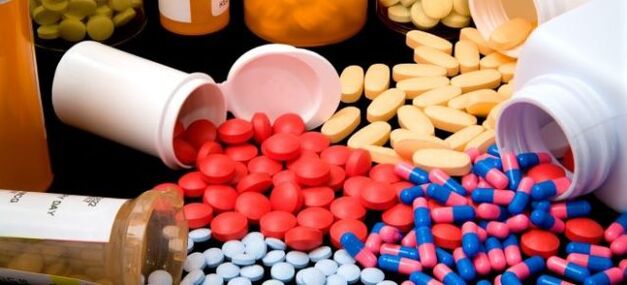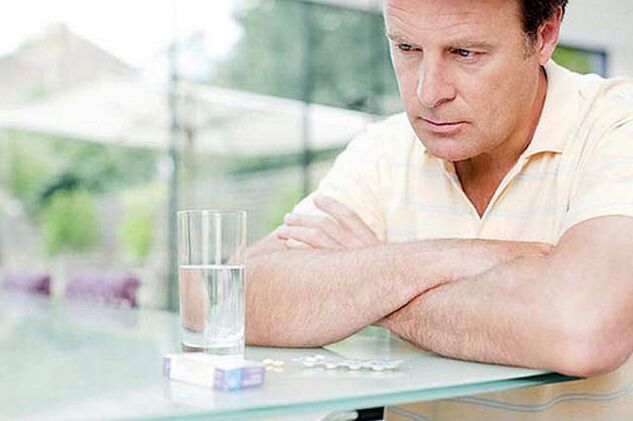To eliminate pronounced clinical symptoms and infectious process in the prostate gland, doctors prescribe antibiotics with prostatitis in men.It is not recommended to choose a medicine independently, since it can be ineffective against the pathogen that provoked pathology.Only a specialist can determine the name of the drug, its dosage and duration of the therapeutic course.
When appointed
Antibacterial drugs are relatively new drugs invented about a hundred years ago.Thanks to them, you can fight viruses and pathogenic bacteria in a rather short time.The difference between the chemical structure of a drug made it possible to distinguish several types of antimicrobial medicines that can cope with prostatitis of both acute and chronic nature.
The antibiotic with prostatitis is recommended to be taken only if the inflammatory process in the gland is caused by the active reproduction of the pathogenic flora.The remaining forms of the disease (for example, stagnant or chronic non -infectious prostatitis) are not amenable to treatment with these methods.
Important!The main indication for the use of antibacterial agents is acute bacterial inflammation of the prostate gland.

A list of antibiotics recommended for prostatitis
To quickly destroy the focus of the disease and stop the active spread of infection, experts can prescribe antibiotics in prostatitis, the most effective of which are the following:
Fluoroquinolones
Lomefloxacin, levofloxacin, offloxacin, pifloxacin, norfloxacin, ciprofloxacin.Their active components have a wide range of action and affect various types of pathogens.Preparations based on fluoroquinolones are effective against the chronic form of the disease.They are absorbed into the walls of the gastrointestinal tract, from nowhere they enter the cells of organs and tissues, destroying bacteria.
Advantages:
- a high degree of permeability in the tissue, which allows you to cope even with congestive prostatitis, the causes of which are associated with inflammatory processes;
- ensuring the destruction and suppression of the spread of infection in the body due to the ability to integrate into the DNA structure of pathogens;
- almost complete absence of resistance to this substance in microbes;
- Widespread use against acute and chronic type of disease.
Flaws:
- are not appointed to persons over 65 years old and in case of violation of the work of the kidneys;
- Not used for more than 28 days.
Tetracyclines
Minocyclin, doxycycline, tetracycline.Highly active to bacteria causing inflammation of the prostate, but are difficult to tolerate by the body.
Advantages:
- These antibiotics with inflammation of the gland in men are distinguished by a variety of release forms;
- have a wide range of antimicrobial exposure;
- They are not expensive;
- are fast -acting.
Flaws:
- destructive effect on the gastrointestinal tract;
- The need for treatment with antihistamines and probiotics.Otherwise, dysbiosis may develop;
- A large number of side effects and contraindications, due to which they are used only with an acute form of prostatitis and a short course.
Penicillins
Amoxicillin, gasolinecylline sodium.Active substances block the production of peptidlycan from which the cell wall of bacteria is built, which leads to their death.
Advantages:
- high degree of antimicrobial activity to most pathogens;
- good tolerance to the body in the absence of allergic reactions;
- The rapid elimination of the body and a minimal negative effect on the liver.
Flaws:
- low bioavailability and poor penetration into the tissue of the prostate;
- Low effectiveness due to the use of this pharmacological group for decades.
These antibiotics can only be used in acute form.A long -term technique is inappropriate, since an infectious agent quickly produces resistance to penicillin.
Cephalosporins
Cephalor, Ceftibuten, Cefixim, Ceftriaxone.The current components damage cell membranes of microbes, which becomes destructive for them.They are absorbed poorly, irritate the mucous membranes of the digestive tract, lead to a violation of the kidneys and allergies.In case of danger of the development of meningitis, they are not prescribed.They are used intramuscularly, intravenously.
Macrolides
Azithromycin, clarithromycin, roxytromycin.These are the least toxic antibiotics for the treatment of prostatitis in men based on natural components.However, due to the lack of data on the effectiveness of macrolides, they are not often assigned.Patients tolerate therapy well, practically do not complain of allergic reactions, inhibition of the liver and kidneys, destruction of articular tissues and intoxication.
Aminoglycosides
Amikacin, streptomycin, tobramycin.They are used when the type of pathogen of the infectious process cannot be recognized.Mostly produced in ampoules and dragees.In the acute form of the disease, the course of treatment is from 2 to 4 weeks.Then the tests are re -pass and once again drink the course of the drug.

Antibiotic intake scheme for acute and chronic prostatitis
To determine which antibiotics to take with prostatitis in men, it is necessary to undergo laboratory diagnostics.The tests will show the type of pathogen in each case, and determine the resistance of the pathogenic flora to a particular antibacterial agent.Having received the results of the study, the doctor will tell you what to accept and describe the treatment regimen, which includes:
- the use of antibiotics to destroy bacterial elements in iron and tissues located next to it;
- the use of medicines that improve blood circulation and reduce stagnant processes;
- taking anti -inflammatory drugs with swelling, pain syndrome during urination;
- strengthening immunity using immunomodulators;
- vitamin therapy, taking mineral complexes;
- the use of sedatives that soothing the nervous system;
- Grassing, prostate massage, physiotherapy.
In acute form, treatment is carried out in a hospital or outpatiently.Use complex medicines: cephalosporins, tetracycline, fluoroquinolones.To achieve positive dynamics as soon as possible, the urologist may prescribe a simultaneous intake of two types of antibiotics.
As a rule, the result of treatment is noticed immediately, but it is impossible to interrupt the course.It mainly lasts about four weeks.If you do not comply with the dosage recommended by the doctor and stop taking the medicine, the inflammation of the rotting into a chronic form.
Treatment of chronic prostatitis with antibiotics is carried out taking into account the sensitivity of pathogenic flora.Cephalosporins, macrolides, fluoroquinolones are considered highly effective.The minimum course of therapy is one month.Possible breaks with the resumption of the treatment cycle.
Advantages and disadvantages
Antibacterial drugs are always used in an infectious process and repeating relapses during the year.
The advantages of using such drugs include:
- efficiency and speed;
- bacteriostatic effects that prevent the reproduction of pathogens;
- Simplicity of use: most medications are injected or accepted as orally;
- Accessibility and low cost.
The pronounced disadvantages of treatment with prostatitis antibiotics include systemic side effects that arise depending on the chosen agent and the presence of contraindications.
General recommendations
If a man undergoes the treatment of bacterial prostatitis with antibiotics, he should know some features of these funds, which will help to avoid unpleasant consequences and overcome the main ailment.
- Antibiotics reduce immunity due to suppression of normal microflora.After therapy, it is necessary to drink the course of drugs that restore the intestines: Lebenin powder, Bifidobacteria Bifidum;
- Antibacterial therapy often causes the development of severe allergic reactions, so if the patient at least once had itching, burning, rashes on the skin after taking this or that tool, it is better to use another tool;
- Prolonged use of antibiotics negatively affects the liver.During the therapeutic course, it is advisable to take hepatoprotectors;
- The tablet is washed down with a sufficient amount of water during or after eating (if the instructions do not indicate another order);
- If at the end of treatment the improvement has not occurred, then it is necessary to tell the doctor about this;
- In the presence of acute form of pancreatitis, the drug effect of antimicrobial drugs can occur only on 5-6 days of treatment;
- It is strictly forbidden to independently adjust the dosage or stop the appointed course.The symptoms of the disease will certainly return, with even greater strength;
- In chronic infectious prostatitis, antibiotics must be sprinkled regularly, since one course is not enough.
Combination with other means
What antibiotics for prostatitis are the best, list of drugs, intake scheme - all this is discussed with a doctor.As a rule, it takes 2 weeks to treat the acute form of inflammation of the prostate gland, and the chronic-4-5 weeks.Each product has its own special instructions, composition and instructions for use, which must be familiarized with before the start of therapy.
Medicines are selected taking into account the compatibility of active components.For example, penicillins are not prescribed with sulfonamides, fluoroquinolons are not prescribed simultaneously with the NSAIDs and derivatives of nitroimidazole, and tetracyclines are not used with iron preparations.During antibiotic therapy, it is forbidden to drink alcohol, which means that all herbal tinctures with ethanol should be excluded.
The list of the most effective
The main scheme for the treatment of prostatitis with antibiotics is determined individually, depending on the degree of neglect of the disease, the type of pathogen, state of the body of a man.
The list of the most commonly prescribed drugs includes:
- Azithromycin 1 capsule (500 mg) once a day;
- Josamycin 2 tablets (1 g) once a day;
- Doxycycline for 1 capsule (100 mg) twice a day;
- Clarithromycin at 0.5-1 tablet (250-500 mg) twice a day;
- Levofloxacin 1 tablet (500 mg) once a day;
- Oleandomycin 2-4 tablets (250-500 mg) once a day;
- Tetracycline for 1 capsule (250 mg) four times per day every 6 hours;
- Ceftriaxone 1-2 ampoules (1-2 g) intramuscularly once a day;
- Ciprofloxacin 1-2 tablets (250-500 mg) twice a day.
In the bacterial form of the disease, they do not use:
- corticosteroids;
- non -steroidal anti -inflammatory drugs;
- laxatives;
- alpha blockers;
- 5-alpha inhibitors slowing the growth of glandular tissues.
Injections and drip introduction
If there is no body reaction to antibiotics with prostate adenoma and prostatitis, the urologist prescribes parenteral administration of the drug.This method is considered only in cases where all possible methods of introducing drug therapy have been tried.
This is due to the fact that infectious prostatitis in some cases is caused by a local inflammatory process against the background of an autoimmune disease, and oral agents cannot correct the situation.For intravenous administration, third -generation cephalosporins are used.Typically, five droppers are enough for the patient's condition to improve significantly.
Contraindications and side effects
Of the general contraindications of antimicrobials, one can distinguish:
- acute disorders of the gastrointestinal tract;
- hypersensitivity to components included in the recipe of one or another antibiotic;
- severe diseases of the liver and kidneys;
- heart pathology;
- bronchial asthma;
- mental disorders and depressive state;
- diabetes mellitus;
- Children's age is up to 18 years.
Against the background of antibiotic intake, side effects can develop, including:
- diarrhea syndrome and dysbiosis;
- development of fungal flora in the mouth and genitals;
- the formation of calculi in the kidneys;
- violation of blood coagulation;
- photosensitivity;
- allergies;
- The stability of some bacteria to the active component.

Reviews of patients and doctors
- The husband was diagnosed with chronic prostatitis.But he was not enough antibiotics for recovery.Additionally, I had to go to prostate massage and take vitamins.The treatment was expensive, but well -being improved a lot.Plus, we managed to get pregnant, which we had dreamed of for more than one year.
- When I was detected by acute inflammation of the prostate gland, I asked the urologist to prescribe antibiotics from prostatitis inexpensive and effective.The only thing that came is a tetracycline.After him, I immediately felt better, although in the morning I tormented heartburn and diarrhea began.I solved this problem by probiotics.As a result, the treatment ended well.
- Levofloxacin took with other pills and put rectal suppositories.Side phenomena could not be avoided.I walked all day in a fog, my head hurt and was sick.But the chronic form after the end of treatment does not exacerbate, I hope, and will not worsen.
- Treatment of a bacteriological type of disease with the most effective antibiotics ends positively in 95% of cases.It is important to conduct diagnostics in a timely manner and begin therapy in the early stages of the disease.It is recommended to use medicinal herbs and perform exercises for men as a prevention of relapse and additions to drugs.






























